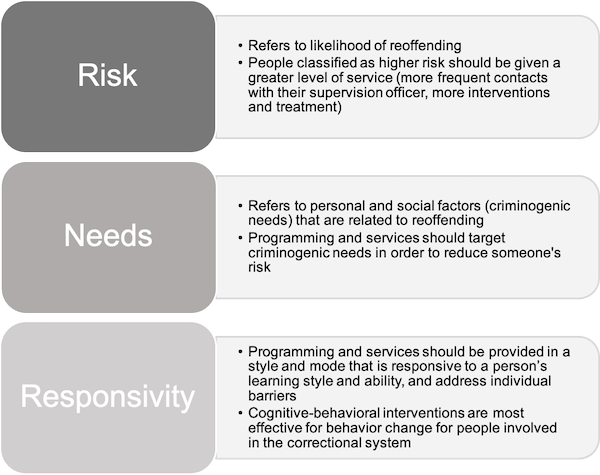Aligning Supervision Conditions with Risk and Needs

The Robina Institute of Criminal Law and Criminal Justice and the University of Cincinnati Corrections Institute partnered on a multi-year project, “Aligning Supervision Conditions with Risk and Needs,” to improve how supervision conditions are set for people on probation and parole by creating improved alignment between supervision conditions and the factors related to their likelihood of reoffending.
The Project
Supervision agencies have put extensive effort into implementing evidence-based practices that follow a risk-need-responsivity approach (a set of rehabilitation principles that aligns an individual’s risk and needs with appropriate supervision and treatment). However, most people on probation and parole are ordered to comply with a range of supervision conditions, many of which are unrelated to public safety or to behaviors that are related to their risk to reoffend. This project sought to link sentencing and parole release decision-making practices to the risk-needs-responsivity framework used in community supervision.
The risk-needs-responsivity framework comprises three core principles:

Research suggests that in order to reduce re-offending, probation and parole conditions should reflect risk-needs-responsivity principles. However, supervision officers are constrained in their ability to fully implement risk-needs-responsivity practices because supervision conditions are set by the courts and parole boards, and often conditions do not align with these principles. This project sought to correct that by tying the conditions of probation and parole to the individual’s risk and needs.
This project consisted of three phases:
Phase One
Perform research in three sites to determine how probation and parole conditions were set and develop a curriculum to help sites implement new policies and procedures that increase alignment between supervision conditions with risk and needs. This approach targeted all key decision-makers who can impact how supervision conditions are assigned: judges, parole board members, prosecutors, public defenders/defense attorneys, parole hearing officers, and supervision officers.
Phase Two
Offer policy recommendations and provide training at the three pilot sites on how to set conditions that are aligned with risk and needs; evaluate how well the policy change was implemented.
Phase Three
Finalize a curriculum on risk and needs-based condition setting for other probation and parole agencies to use, and disseminate research findings and lessons learned in policy briefs and publications.
This project was made possible with generous support from Arnold Ventures.
Contact Us
Robina Institute of Criminal Law and Criminal Justice
[email protected]
612-626-6600







